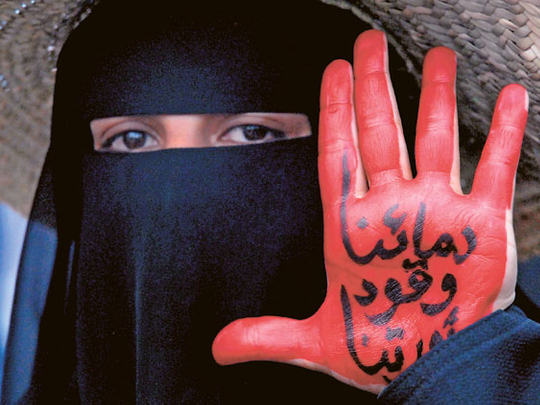
Sana'a: Early in Yemen's uprising, about 20 women with banners demanding equal rights marched into the heart of the capital, joining the thousands who were calling for the overthrow of the president. They were greeted with cheers.
The women settled into a spot below the stage in the middle of Change Square. But as the days passed, "the women's section" became off-limits to men. A fence went up around it. Then straw mats were slung over the fence to conceal the women. Policed by males, Yemen's traditional gender segregation had insinuated itself into the centre of the revolt.
Women are fighting to keep demands for their rights at the centre of Yemen's uprising and resist efforts to sideline them. The main goal of the protests is an end to President Ali Abdullah Saleh's regime, in place for nearly 33 years. But the liberals who launched the campaign nine months ago have always had broader hopes for blanket social change in a country where tribe and tradition dominates, no matter who is in power.
Women's role in the uprising was recognised globally when Tawakul Karman, a female icon of the protest movement, won the 2011 Nobel Peace Prize. But in Sana'a, the reality is that every woman who joins the rallies has to rebel against the heavy pressure of social codes.
Hardliners' influence
They also face the growing influence of hard-liners at Change Square, as activists have named the intersection where they have set up their protest camp. Hardliners dominate Change Square's organisational committee and have attacked tents where men and women were gathered, seeking to undo the gender mixing that has been fostered by the revolution.
"They are systematically excluding us women," said Wameedh Shaker, who wears the hallmarks of liberal Yemeni womanhood — jeans, knee-length coat and a scarf covering her hair.
She remembers the exhilarating welcome for that first march.
"We felt like everything we can dream of will come true," said Shaker, a 31-year-old mother of one. "Coming into the square was like going to a paradise of respect and compassion. It was like the best men and women of Yemen gathered at one place."
About a fifth of those taking to the streets every day in protests are women — a level of participation that in itself represents a revolution for Yemen, where women are discouraged from inserting themselves into the public eye, much less public debate.
In a poor nation of mountains, desert and few resources, women have had the poorest lot: female illiteracy runs at 70 per cent, an average of eight women die every day because of poor health services or total lack of them. Men across much of the country marry girls as young as ten, with no legal minimum age for marriage. Only seven per cent of Yemeni women earn a wage, though in most cases they raise the children, tend the land, graze sheep and cattle, cook and clean. Protest, or even participation in public debate, is rare.
Somaya Al Qawas embodies the change. She used to wear the most conservative of women's attire in Yemen, the khymar — the all-black that covers the body and head and hides the eyes behind a semi-translucent piece of cloth.
Towards moderation
In her early 20s, she took a small step toward moderation: She switched to the veil in which a slit exposes the eyes. And last month, at age 30, she marched into the makeshift hospital at the Change Square protest camp in a head scarf that exposed her face and a broad smile to the world.
"I told you I would, didn't I? Maybe you didn't expect it so soon," the mother of two said. "Am I the same person still? Yes. But some look at me as if I have become morally loose."
Al Qawas says her businessman husband, Hesham Al Hameri, backed her decision to join the protests. But Yemeni men in general are her adversary. "The next revolution in Yemen is a revolution against men's oppression of women," she said.
In past upheaval women's rights took a back seat to other nationalist goals. Now, women insist their time has come.












